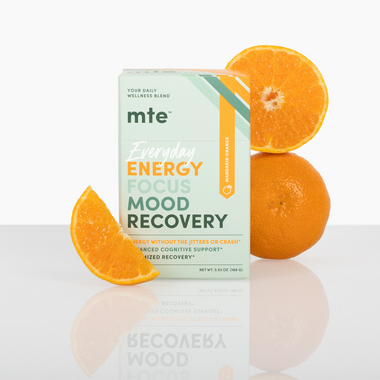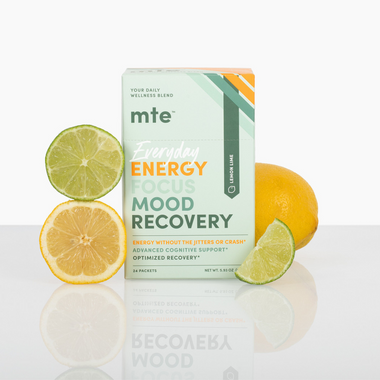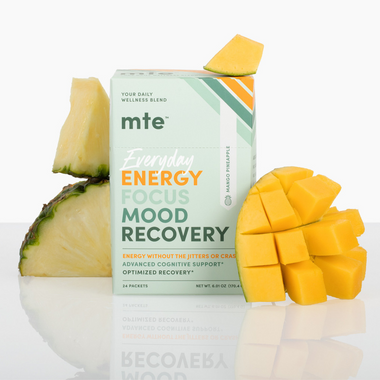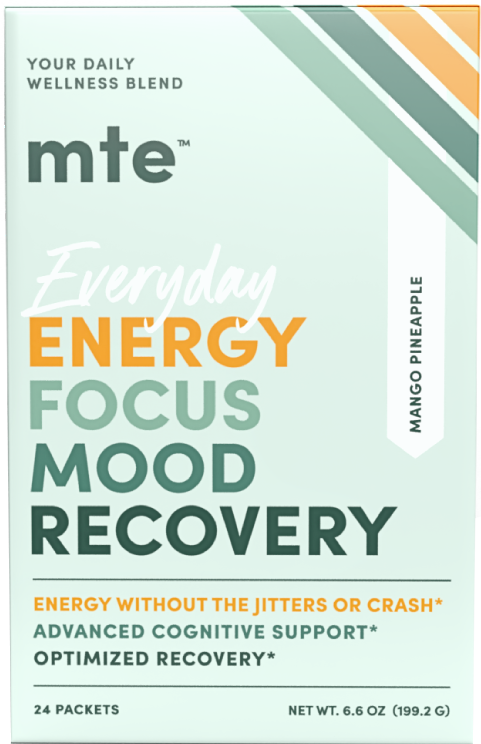
Theacrine, Paraxanthine, & the Caffeine of it All: Staying Awake Without Coffee
If you're like most people, you've become heavily reliant on caffeine to wake up, get focused and get through the day. Unfortunately, that often comes with a price.
It seems adverse effects like jitters, crash and habituation (the need for more to get the same effect) are developing for caffeine users more than ever before. Probably because we’ve never been as tired, overscheduled, and overstimulated as we are today. This explains, at least in part, why many people have begun to look for healthy caffeine alternatives. Two of these include theacrine and paraxanthine. But what are they?. And are they any better than caffeine? Is there anything out there that can restore our will to live without giving us insomnia and a crippling addiction?
Asking for a friend.
What is Paraxanthine?
Paraxanthine is a nootropic compound produced when caffeine is broken down by the liver. Comprising 80% of caffeine byproducts, paraxanthine is essentially all the caffeine benefits without the drawbacks. Until recently, we could only observe it in the lab, but now it’s been synthesized so it can be used as an ingredient in healthy energy drinks. So it might seem like the new kid on the block, but it’s been hiding behind the proverbial curtains since the beginning of time.
Unlike caffeine, which relies on generating and sustaining a false stress response to get that energy and focus boost, paraxanthine deftly modulates neurotransmitters associated with mood, cognition, and motivation while quieting fatigue signals. The result is boosted performance - mental and physical - and you don’t feel awful the whole time. In fact, in the studies on paraaxanthine supplements for energy and focus, paraxanthine side effects are minimal to none in most people.
What Are the Benefits of Paraxanthine?
Paraxanthine seems to be the dream replacement for energy drinks and coffee, as it’s shaken off all the drawbacks of its parent caffeine. Could it be the holy grail of staying awake without coffee and feeling great in your daily life? Maybe we’re fan-girling. But maybe not - it hasn’t been in the game for long and it’s already gaining major traction in the scientific community. What’s more, its benefits begin at doses as low as 50mg and are consistent at 100mg. For reference, a cup of coffee is about 100mg of caffeine. For most of us, that doesn’t do a whole lot.
So let’s look at some of the evidence for paraxanthine as the ideal caffeine alternative:
Stress-Free Energy
An early study from 2010 compared paraxanthine to caffeine in an induced-narcolepsy model. They didn’t give people narcolepsy - just mice. Sorry, little dudes. Anyway, they found that paraxanthine not only promoted wakefulness better and longer than an equal dose of caffeine, but they observed an increase in muscle activation and body temperature - indications of thermogenesis. Paraxanthine induced less anxiety than caffeine, and in a high-dose treatment, only caffeine caused hypothermia and fatigue.
Thermogenesis Without Anxiety
Speaking of stress-free energy, a 2024 study looked at the potential of paraxanthine to boost metabolism compared to placebo. Paraxanthine increased energy expenditure and satiety, meaning fewer hunger cravings even with more energy spent. It also increased calorie burn and rate of fat oxidation but did not increase blood pressure or feelings of anxiety, and it lowered resting heart rate, which is a marker of cardiovascular health (low = good).
Cognitive Agility After Fatigue
Another study from 2024 looked at the effects of caffeine vs paraxanthine supplements for focus and cognition in a state of exhaustion, which is known to result in brain fog and mental fatigue. Paraxanthine reaction times were 30% faster than caffeine and errors in memory retention were 25% less than caffeine. In addition, paraxanthine reduced errors by 7% while caffeine increased them by 32%.
Increased Muscle Growth
A 2022 study explored whether paraxanthine improved physical capacity by administering paraxanthine supplements to mice, making them exercise, and then measuring how swole they got. The study compared paraxanthine to several other popular fitness-boosting stimulants. They found that across all substances, paraxanthine increased muscle mass, physical performance, and nitric oxide levels better than all others. They also observed with paraxanthine a significant decrease in LDL cholesterol (the bad one) and triglycerides while HDL cholesterol (the good one) increased.
What is Theacrine?
Theacrine is a plant-derived nootropic and purine alkaloid found in the leaves of a tea plant called kucha. Alkaloids are vital metabolites that protect plants and regulate processes like growth. When ingested by humans, alkaloids can have anesthetic, anti-inflammatory, antibacterial, analgesic, and other beneficial effects.
Sometimes referred to as clean-caffeine, theacrine has a similar chemical structure to caffeine, so it also works by targeting specific receptors in your brain. After consumption, people report feeling more focused, motivated and energized but in a tranquil way, free of the jitters or the crash associated with caffeine.
This is why theacrine is gaining in popularity as an effective alternative to caffeine with those who want an energizing drink but don't want the heart-pounding, jitters and crash of caffeine. Many healthy energy supplements today rely on theacrine instead of caffeine in their formulations because it opens up the possibility to have the drink any time of the day without worrying about the insomnia typical of afternoon caffeine consumption.
Of these two caffeine substitutes, we chose paraxanthine for MTE - we think it’s got a bit of an edge when it comes to potency, function, benefits, and side effects.
What Are the Benefits of Consuming Theacrine?
Theacrine makes a healthiersubstitute for tea and coffee because it also seems to promote sustained energy without the drawbacks of coffee and energy drinks. In addition, there is no indication this alkaloid raises your blood pressure or heart rate, and there's no evidence the body will build a tolerance to it like caffeine.
Here are the theacrine benefits researchers have observed so far during clinical trials and everyday use:
Promotes Sustained Energy
Theacrine doesn't overstimulate the way caffeine and sugar bombs do. In fact, it should promotes a calm, continuous flow of energy that helps you stay alert throughout the day without all the hangry jitters and unease. As a result, theacrine can support you finishing that important assignment, work report, gaming session, or workout without feeling like you need a nap afterward.
That's because it appears to work differently than caffeine, gently modulating levels of ALERT and TIRED neurotransmitters, where caffeine just jams itself in the middle of everything and only let's the ALERT neurochemicals talk, creating an angry neurochemical mob of energy that dissipates just as violently as it began.
When the caffeine is all gone, all the TIRED signalers and their receptors are all that's left, and you can bet those ALERT signalers have been depleted. Ergo: crash. Theacrine's less heavy-handed approach prevents this energy whiplash.
Research reports that people who consume theacrine report feeling more energized and motivated while feeling less groggy and lethargic. It follows that if you don't feel like crap you're more likely to go and get stuff done.
However, keep in mind that theacrine works a little slower than caffeine, as its half-life is longer once it's in the bloodstream. It needs around one hour to reach 80% of energy benefits, and its peak is 3-4 hours after consumption. People report effects to last up to eight hours.
In contrast, it takes about 30 minutes to reap the benefits of caffeine, and the effects you can feel last for 4 hours max, which is why you need that mid-afternoon cup, too. In terms of energy production, caffeine falls short of theacrine in every way.
Theacrine shouldn't affect your sleep or cause insomnia, but it's better to avoid using it in the evening. One study even reported that this supplement could help improve your sleep. However, the study was done in mice, and we need more findings to confirm these effects in humans.
Supports Cognitive Performance
A pilot study published in 2022 saw supplementation with theacrine improve cognitive parameters in addition to energy-boosting benefits. People taking the supplements in the study showed better self-reported concentration, alertness and attentiveness.
Other studies also highlight theacrine's potential to improve energy, alertness and concentration, confirming its viability as a coffee alternative for focus.
Promotes Athletic Performance
Athletes and bodybuilders often use caffeine before working out to train harder and improve performance. So, the main question is: can theacrine do that? Athletes sure seem to think so. People take theacrine to boost energy and reduce fatigue. A daily pre-workout scoop of a wellness powder containing theacrine could positively affect physical performance in other ways as well:
A 2019 study examined the effects of theacrine on the performance of high-level soccer players. They observed this supplement increase endurance by boosting run-to-exhaustion times by as much as 38%. This significant improvement could greatly benefit many athletes and improve their overall performance.
Supports Against Inflammation
The kucha tea plant is native to China, where it is used to treat common colds. It appears that theacrine is one of the main compounds in the kucha plant responsible for its efficacy as a homeopathic treatment. That's because this alkaloid has documented anti-inflammatory and analgesic properties.
Promotes Mood Health
One way that theacrine works is by binding to specific receptors in your brain responsible for feelings of motivation, pleasure and satisfaction. When theacrine communicates with these receptors, it signals your brain to produce more of those feel-good chemicals. This can contribute to improved mood and motivation in a measured and sustainable way.
A 2015 study confirmed self-reported mood improvements after theacrine supplementation. In another pilot trial, theacrine improved subjects' motivation to exercise and reduced chronic distress. A new study using mice as subjects also supported theacrine's mood elevating benefits.
What is Caffeine?
Most people know that your morning coffee contains caffeine, but what is caffeine, exactly?
Caffeine is a naturally-occurring substance found in over 60 plants. It stimulates your central nervous system by blocking the receptor that receive fatigue signals, which prevents you from feeling tired. As a result, you feel more energized and ready to take on any challenges the day brings.
What are the Benefits of Caffeine?
Drinking caffeine has several touted benefits for your health, including increased energy and reduced fatigue, which can help promote better mental and physical performance. Caffeine is also used to support your metabolism and promote endurance, which is why many athletes and gym-goers use caffeinated pre-workout supplements to support pushing through those last 12 reps or adding another plate or two to that barbell.
According to research, caffeine intake has been linked with a lower chance of developing Type 2 Diabetes. In addition, regular coffee consumption could have other health benefits, including cardiovascular support, blood sugar regulation, and liver support, and it may also be neuroprotective.
However, consuming too much caffeine is definitely bad for your health; overconsumption may cause arrhythmias, sleep problems, apprehension, headaches, and more. So, if you're looking to detox from coffee, theacrine could very well be the perfect alternative.
Where Theacrine & Paraxanthine Blow Caffeine Out of the Water:
While their mechanisms and molecular structures may be similar, a daily caffeine-centric beverage is not the same as an herbal drink with paraxanthine or theacrine as the active energy ingredient. Some of the most notable differences include:
- No tolerance – Most people need to increase caffeine dosage over time to experience the same benefits. Theacrine and paraxanthine, so far, have not demonstrated any habituation properties.
- Stress reduction – Increased reactivity to stress is one of the most commonly reported side effects of caffeine consumption. Theacrine and paraxanthine do not demonstrate the same effects, and may even have the opposite effect via neuronal activity involving mood and reward.
- No effects on heart rate and blood pressure – Drinking too much caffeine could temporarily increase blood flow and cause arrhythmias. And people who don't consume caffeine regularly are at higher risk of these adverse effects. In comparison, theacrine has not shown a tendency to affect blood pressure or heart rhythm, and paraxanthine may actually lower heart rate and blood pressure.
- Tranquil energy – Unlike caffeine, which can give you a temporary energy boost and then leaves you crashing, theacrine may provide smoother, sustained energy. Similarly, paraxanthine’s energy boost is even and long-lasting with no crash. .
- No jitters or tremors – Caffeine could cause jitters, tremors, and other unpleasant sensations. Since theacrine and paraxanthine stimulate the CNS in a much gentler way, users don't commonly report experiencing these types of effects.
Are Theacrine & Paraxanthine Safe?
Pretty much all the current literature on paraxanthine side effects found little to none, and when compared against caffeine, paraxanthine doesn’t cause mutagenic effects or toxicity at high doses.
A study examining the safety of theacrine found that doses up to 300mg per day were safe and well-tolerated. In addition, this energy-boosting nootropic helped reduce total and low-density cholesterol (LDL) levels while leaving high-density-cholesterol (HDL) levels alone. LDL cholesterol is the bad stuff – it sticks to your arterial walls and builds up over time. Studies on paraxanthine have noted a similar effect, and even positive indications for cardiovascular health.
Keep in mind that we don't have enough evidence to determine the safety and efficacy of nootropics for everyone. That's why people who are pregnant or breastfeeding, recovering from surgery, or dealing with chronic health conditions should consult a medical professional before adding an energy supplement to their daily routine.
Do These Caffeine Alternatives Work with Other Nootropics & Adaptogens?
The good news is that theacrine and paraxanthine are compatible with other nootropics and adaptogens, so if you are looking for all-around support, there are fantastic supplement options. MTE is a healthy energy supplement in powder form that combines paraxanthine with 9other nootropics, adaptogens and superfoods to support better energy levels, mood, stress response, sleep, and much more.
The unique formulation of this daily green drink uses some of the most potent bioactive ingredients to help you better deal with the stresses of everyday life, fatigue, recovery, and distraction. It helps you to restore your balance so that you feel less stressed, tired, and unfocused. We’re biased, but we think it’s one of the best paraxanthine supplements for energy and focus out there. It’s indisputably a healthier alternative to caffeine.
So, if you're looking for a coffee alternative for energy, stress-relief and focus, a daily energy greens supplement with paraxanthine can support your overall health and well-being. MTE is a perfect choice, especially if you’ve already got a greens routine like AG1®!
Try MTE and discover well-rounded support for mood, focus, creativity, performance, energy, and more. It’s called the feel-good drink for a reason.






